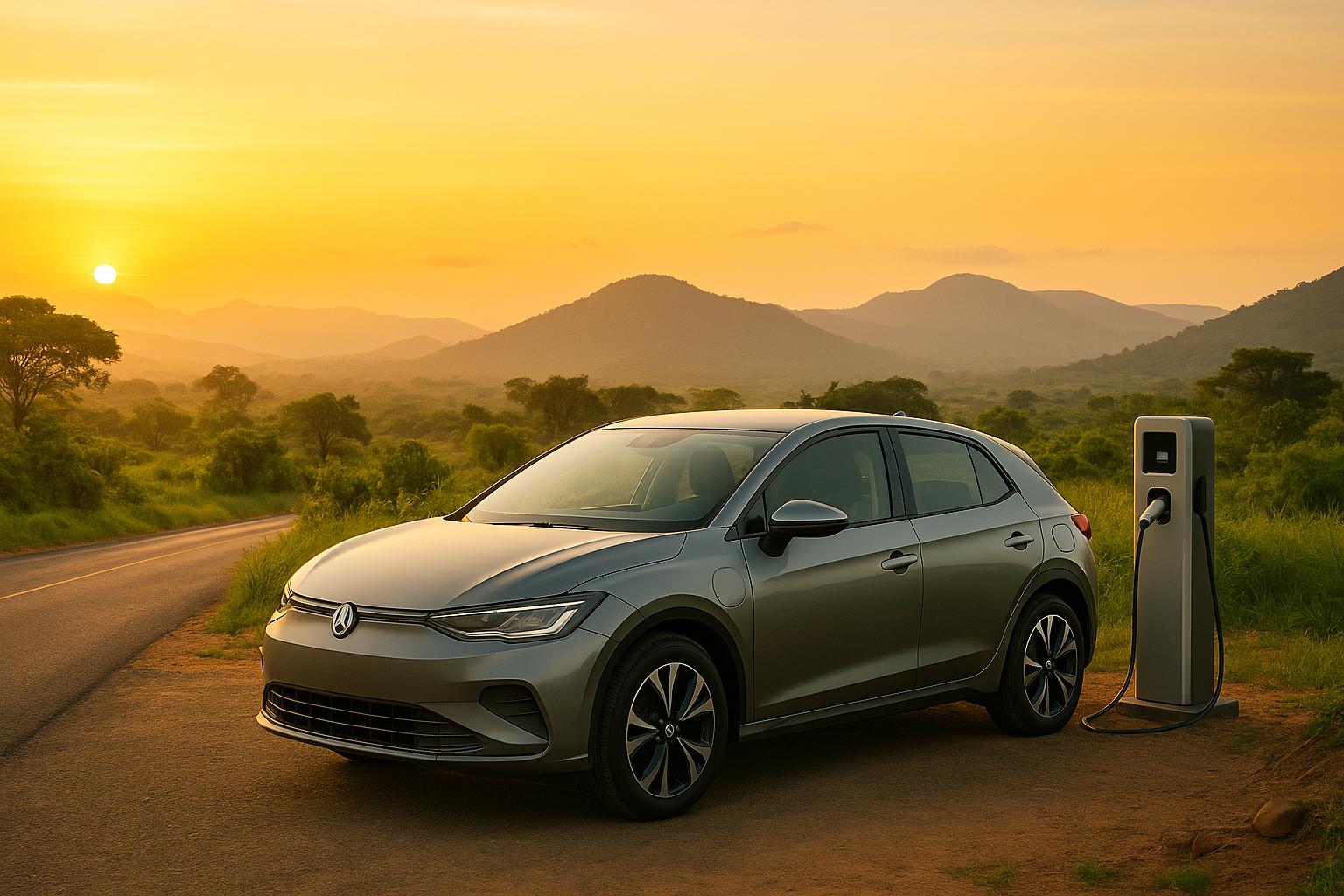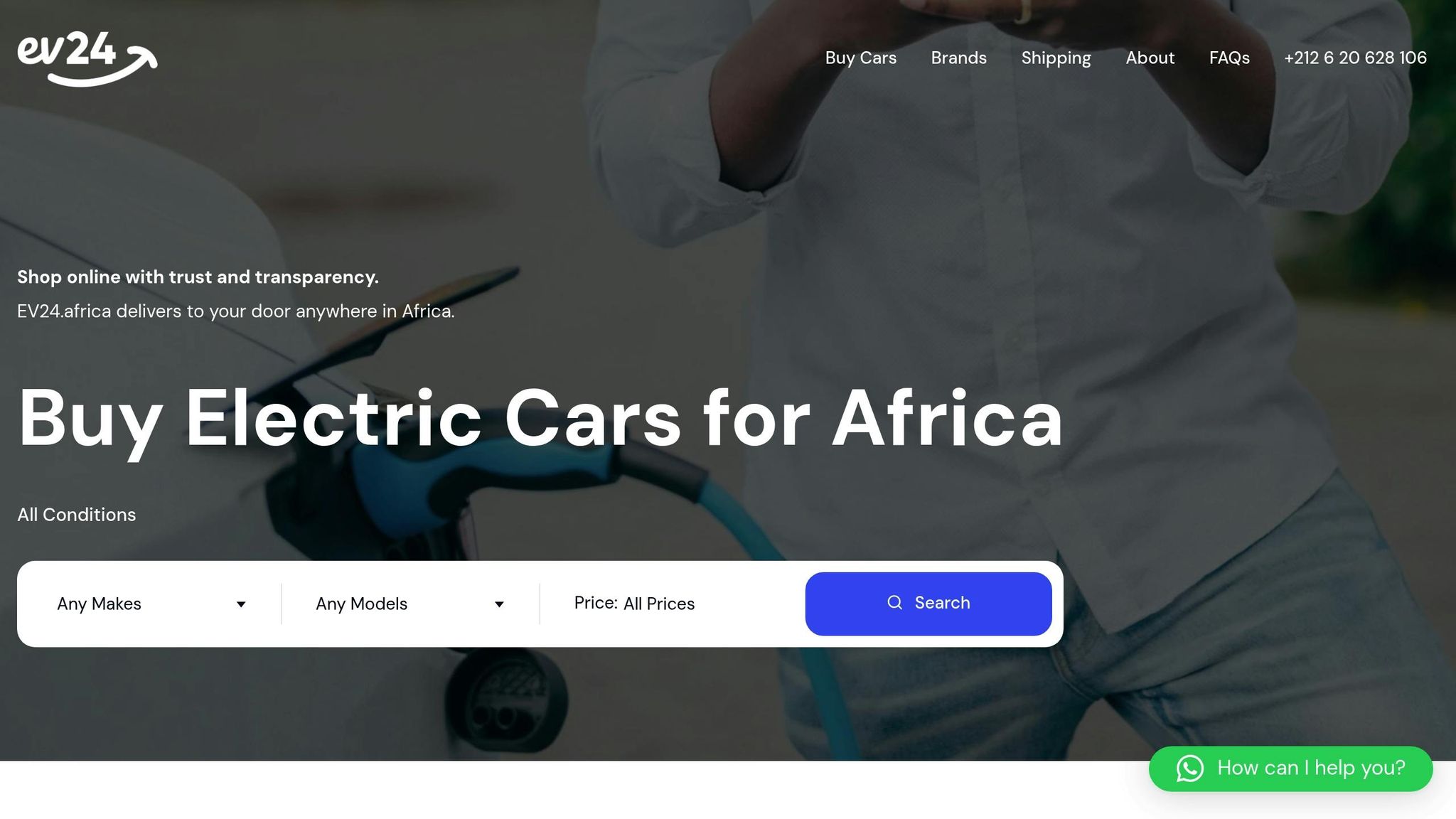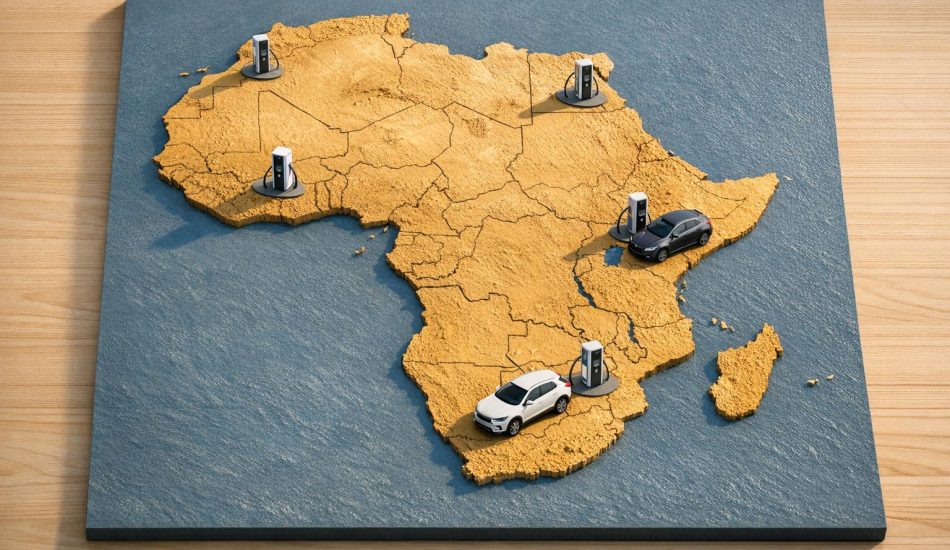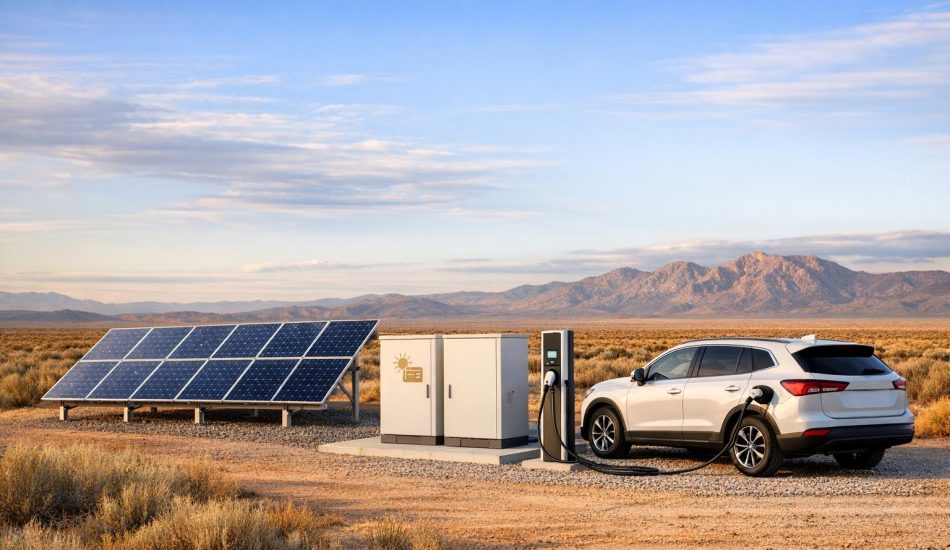
- Costs & Savings: While electric cars can be pricey upfront, they save money in the long run with lower charging and maintenance costs. Options like the Dongfeng Aeolus E70 start at $7,500, while premium models like the Tesla Model 3 cost around $40,200. Financing options and tax incentives can help reduce costs.
- Charging Infrastructure: Uganda is expanding its charging network. Kampala has a public EV charging station, and more are planned. Home charging is an option but can cost up to $40,000 to set up.
- Best Models for Uganda:
- Budget-Friendly: Dongfeng Aeolus E70, BYD e3
- Reliable: Nissan Leaf
- Long-Range: Hyundai Kona Electric, Tesla Model 3
- Road & Climate Suitability: Choose EVs with high ground clearance and durable designs to handle Uganda’s roads and tropical climate. Models with sealed batteries and good cooling systems are ideal.
- Used EVs: Check battery health, maintenance history, and warranty coverage when buying second-hand.
Quick Comparison
| Model | Price (USD) | Range (Miles) | Best For |
|---|---|---|---|
| Dongfeng Aeolus E70 | $7,500 | – | Affordability |
| BYD e3 | $10,700 | – | Practical & Affordable |
| Nissan Leaf | $13,400 | ~150 | Reliability |
| VW e-Golf | $17,400 | ~124 | Urban Driving |
| Hyundai Kona | $21,400 | ~298 | Long Range |
| Tesla Model 3 | $40,200 | 310+ | High-End Performance |
Uganda’s EV market is growing fast, and platforms like EV24.africa simplify the buying process. Start by assessing your budget, charging needs, and road conditions to find the best electric car for you.
Cost of acquiring, maintaining an electric car today
What to Consider Before Buying an Electric Car
Purchasing an electric car in Uganda involves a different set of considerations compared to buying a gasoline vehicle. By understanding these factors, you can make a choice that aligns with your budget and driving needs.
Cost and Total Ownership Expenses
Electric vehicles (EVs) often come with a higher upfront price tag than traditional cars, but their overall ownership costs can be more manageable. They eliminate fuel expenses and tend to have lower maintenance costs, which can save you money over time.
Purchase Price and Financing Options
If you’re looking to cut down on initial costs, consider buying a used electric car. It’s a practical way to save without sacrificing reliability. Financing options are also expanding. For instance, in September 2024, Mogo secured a $5.1 million loan facility from Absa Bank Uganda to boost EV financing. By May 2025, Mogo Uganda had already issued 1,500 electric vehicle loans.
Government incentives and tax breaks can further reduce your purchase costs, but timing is crucial. As Richard Evans, head of technical services at webuyanycar, explains:
"The tax changes indicate that the cost of electric motoring is set to rise. However, EV drivers are currently free from road tax and can avoid charges for another year – if they act now."
Operating Costs
Charging an EV in Uganda is much cheaper than fueling a gasoline car. With a commercial electricity tariff of about $0.19 per kWh, EV owners enjoy significantly lower per-mile costs. This is particularly relevant in a country where fuel imports accounted for $1.6 billion, or 17.1% of Uganda’s total import bill, in 2023.
Long-term Investment Considerations
To get the most out of your investment, prioritize EV models with long-lasting batteries and low maintenance needs. Since battery replacement is often the most expensive aspect of EV ownership, choosing a car with a proven track record for battery durability is key.
Once you’ve assessed the costs, it’s time to consider Uganda’s charging infrastructure.
Charging Options in Uganda
While Uganda’s charging infrastructure is still developing, there are promising advancements that make EV ownership more practical.
Current Infrastructure
By 2025, Uganda had launched its first public EV charging station in Kampala as part of a pilot program. This station offers power outputs between 30kW and 360kW, allowing for recharging times of 15 to 90 minutes. Additionally, the government plans to establish at least 10 more charging stations within the Kampala Metropolitan area soon. Even some petrol stations are incorporating EV charging points, with usage steadily increasing.
Future Infrastructure Plans
Looking ahead, Uganda aims to build a network of 3,500 public EV charging stations by 2040, complemented by over 10,000 fast chargers. The goal is to ensure a charging station is available within a 31-mile radius across the country.
Energy Minister Ruth Nankabirwa emphasized the government’s commitment, stating:
"The charging station we have launched today demonstrates our government’s commitment to e-mobility".
Home Charging Solutions
Installing a home charging setup, including a quality charger and transformer, can cost up to $40,000. However, home charging provides convenience and reduces reliance on public infrastructure.
Planning Your Charging Strategy
With relatively few EVs on Uganda’s roads, it’s crucial to plan your charging routine. Consider your access to home charging and proximity to public stations when deciding if an EV suits your lifestyle.
Cars That Work Well in Uganda
Once you’ve evaluated costs and charging logistics, the next step is selecting an EV that can handle Uganda’s unique road conditions and climate.
Road Condition Requirements
Uganda’s roads vary from paved highways to rugged rural paths, so durability is a must. Vehicles with high ground clearance are better suited for navigating potholes, unpaved roads, and challenging terrain. Models like the Tesla Model X, newer Nissan Leafs, and the BYD Tang EV are well-equipped for Uganda’s conditions, offering features like all-wheel drive, durable suspensions, and regenerative braking.
Battery Range Considerations
In areas with limited charging stations, a vehicle’s battery range becomes critical. Choose an EV that meets your longest travel needs and consider models with regenerative braking to extend range during city driving.
Climate and Environmental Factors
Uganda’s tropical climate and dusty conditions demand vehicles with sealed battery compartments, efficient cooling systems, and sturdy electrical components to handle high humidity and temperature swings.
Maintenance and Service Availability
Before buying, check for authorized service centers and spare parts availability for your chosen model. Cars with simpler electrical systems and established service networks in East Africa tend to be easier and cheaper to maintain.
Best Electric Car Models for Uganda in 2025
When choosing an electric vehicle (EV) for Uganda, it’s essential to consider affordability, road conditions, and the growing charging infrastructure. Several EV models stand out as excellent options for the country, offering a mix of reliability, performance, and cost-effectiveness.
Top EV Models for Uganda
One of the most budget-friendly choices is the Dongfeng Aeolus E70, available on EV24.africa for about $7,500 (UGX 28,000,000). This Chinese-made sedan is well-suited for Uganda’s diverse road conditions and offers dependable build quality.
The Nissan Leaf is another reliable option, starting at approximately $13,400 (UGX 50 million). With a range of around 150 miles per charge, it’s a proven favorite for those prioritizing consistent performance. For a slightly lower price, the BYD e3 comes in at about $10,700 (UGX 40 million), providing practical performance tailored for emerging markets.
If you’re looking for a longer range, the Hyundai Kona Electric is a strong contender. Priced at around $21,400 (UGX 80 million), it offers a range of up to 298 miles, making it ideal for areas with limited charging options. On the premium end, the Tesla Model 3 starts at $40,200 (UGX 150 million). With cutting-edge technology and a range exceeding 310 miles, it’s perfect for buyers seeking high-end performance. Meanwhile, the Volkswagen e-Golf, priced at $17,400 (UGX 65 million), combines German engineering with a range of about 124 miles, making it a solid choice for urban driving.
Model Comparison Chart
Here’s a quick breakdown of these models to help you decide:
| Model | Starting Price (USD) | Range (Miles) | Key Strengths for Uganda |
|---|---|---|---|
| Dongfeng Aeolus E70 | $7,500 | – | Extremely affordable |
| BYD e3 | $10,700 | – | Affordable and practical |
| Nissan Leaf | $13,400 | ~150 | Reliable and efficient |
| Volkswagen e-Golf | $17,400 | ~124 | Durable German engineering |
| Hyundai Kona Electric | $21,400 | ~298 | Excellent range and performance |
| Tesla Model 3 | $40,200 | 310+ | High-tech and long-range |
Growing EV Market in Uganda
Uganda’s interest in EVs is steadily increasing. In the first four months of 2024, the country imported 1,694 electric units, including 17 fully electric vehicles, signaling a shift toward greener transportation options.
When deciding on an EV, think about your daily driving habits and access to charging stations. The Dongfeng Aeolus E70 and BYD e3 are fantastic for budget-conscious buyers, while the Hyundai Kona Electric offers a balance between price and range. For those prioritizing reliability, the Nissan Leaf continues to be a dependable choice.
Rob de Jong, Head of the Sustainable Mobility Unit at the United Nations Environment Programme, captures the global shift toward EVs:
"Electric vehicles are winning. The train has left the station. There might be some question about how fast it will go. But it’s not coming back."
With this momentum, investing in an EV in Uganda makes sense as infrastructure and support systems continue to grow.
sbb-itb-99e19e3
How to Check if an Electric Car is Reliable
Investing in an electric vehicle (EV) in Uganda comes with unique considerations. The country’s hot climate, varied road conditions, and evolving charging infrastructure make it crucial to thoroughly assess an EV’s reliability. Here’s how you can evaluate whether an electric car is dependable enough to meet your long-term needs.
Checking Vehicle Dependability
The battery’s health is the cornerstone of EV reliability. Most modern EVs retain between 80% and 90% of their battery capacity even after clocking 100,000 miles. However, Uganda’s hot climate may accelerate battery degradation, making this factor particularly critical.
Start by researching the specific model’s performance history. According to Consumer Reports, electric vehicles had 42% more issues than gas-powered cars on average in 2024, a notable improvement from 79% in 2023. Jake Fisher, Head of Consumer Reports’ automobile test center, notes:
"As the automakers get more experience with the new technologies and new platforms, they will improve."
Warranty coverage is another key indicator. Most new EVs include an 8-year battery warranty, guaranteeing at least 70% capacity retention. For Uganda’s climate, thermal management systems are especially important, as they protect the battery from heat-related damage. Additionally, service support and spare parts availability are critical. Make sure the manufacturer has authorized service centers in Uganda and check how easily spare parts can be sourced.
If you’re considering a used EV, on-site inspections are essential to ensure the vehicle’s reliability hasn’t been compromised by previous use.
Inspecting Used Electric Cars
When buying a used electric car, start with a battery condition assessment. Sellers can usually provide a battery health report, which typically costs between $150 and $300. This report is crucial for verifying the battery’s current state.
Next, review the dashboard indicators to check battery range efficiency. Conduct a driving range test during your inspection to confirm the vehicle’s performance. Tools like an OBD-II scanner or apps such as ClearWatt EV Health Checker can quickly provide detailed battery metrics.
Beyond the battery, inspect the car’s physical condition and maintenance history. Ask about the charging habits of the previous owner. Frequent use of DC fast charging can cause faster battery wear compared to slower AC charging. Examine the brakes, tires, and charging port for signs of damage or corrosion. Thoroughly review the maintenance records and check for any remaining warranty coverage by contacting the manufacturer with the car’s VIN.
During the test drive, pay attention to smooth acceleration, consistent regenerative braking, and any unusual noises that might indicate deeper issues.
Michael Tziatzios, Head of Used Vehicle Management at DEKRA Automotive, provides reassurance about EV battery durability:
"Overall, the batteries in electric cars are much better than their reputation. Our battery checks clearly support this."
It’s worth noting that EV batteries typically last between 8 and 15 years, with ongoing advancements in technology extending their lifespan. A 2024 analysis by Geotab of 10,000 EVs found that battery degradation rates have improved, now averaging 1.8% per year compared to 2.3% in 2019. With proper care, EV batteries could potentially last 20 years or more.
How to Buy an EV on EV24.africa

EV24.africa simplifies the process of purchasing electric vehicles (EVs) by taking care of sourcing, financing, and delivery for buyers in Uganda and across Africa.
Step-by-Step Buying Process
Once you’ve confirmed the reliability of your desired EV, here’s how the purchasing process works on EV24.africa.
The platform offers a range of both new and certified pre-owned EVs from leading brands like Tesla, BYD, Leapmotor, ROX, Dongfeng, Geely, Hyundai, Toyota, and Suzuki. You can browse through their selection, comparing detailed specifications such as battery capacity, driving range, and charging compatibility.
After finding the EV that suits your needs, reach out to EV24.africa for a personalized quote. Pricing varies depending on country-specific factors like import duties and taxes applicable in Uganda. The team will provide a complete breakdown of all associated costs.
If financing is needed, EV24.africa works with partner banks and local operators to offer flexible payment solutions. As Mogo officials explain:
"These partnerships are more than business deals; they’re a bridge to a cleaner, more inclusive future. Without Mogo’s innovative financing, this rapid progress in Uganda’s e-mobility ecosystem simply wouldn’t be possible."
Once you’ve secured financing or finalized payment arrangements, you can place your order. EV24.africa offers delivery options including port-to-port or door-to-door services. After payment is confirmed, they handle the logistics to ensure smooth delivery and offer ongoing post-sale support.
Delivery and Support Services
EV24.africa’s delivery network covers all 54 African nations, supported by a team of over 200 professionals across five countries and partnerships in more than 40 countries on the continent. For customers in Uganda, vehicles typically arrive through the Port of Mombasa in Kenya before being transported to their final destination.
The platform provides flexible shipping options such as RoRo (Roll-on/Roll-off) and container shipping. They also use standard shipping terms like DDP (Delivered Duty Paid) and FOB (Free on Board) to meet diverse customer needs. Throughout the import process, EV24.africa manages customs clearance, vehicle tracking, and registration support.
Customer support is available at every stage. As the company notes:
"At EV24.africa, customer satisfaction is our top priority. We make importing and buying electric vehicles (EVs) easy, handling everything from sourcing to shipping and delivery in all 54 African countries."
Axel Peyriere, the platform’s CEO, underscores their mission:
"Our goal is to provide a reliable, transparent, and competitive marketplace for EV buyers across the continent."
After delivery, EV24.africa continues to assist with vehicle registration and connects you to expert car service providers, ensuring your EV remains dependable and well-suited for Uganda’s operating conditions.
Making the Right Choice for Your Needs
Choosing an electric car in Uganda means balancing cost, charging availability, and reliability. Your driving habits will determine which factors matter most to you.
If most of your driving happens in urban areas like Kampala and you have access to dependable charging options, an electric vehicle (EV) can be a smart long-term choice. Charging costs are about $0.15 per kWh, which is far cheaper than fuel prices.
However, if you often travel to remote areas where charging infrastructure is limited, a hybrid vehicle might be a better fit. As of 2023, EVs make up less than 0.5% of Uganda’s national fleet, and setting up a single charging station costs approximately $650,000. In Kampala, only two charging stations were installed by the Ministry of Energy and Mineral Development in 2024, showing that infrastructure expansion is still a work in progress.
Uganda’s diverse road conditions are another critical factor. The mix of paved highways and rugged rural roads calls for vehicles built to handle varied terrains. Models like the Tesla Model X and BYD Tang EV, with high ground clearance and durable suspension systems, are well-suited for these challenges.
To manage costs, consider used electric cars or models with longer battery life, which can help lower both the initial investment and long-term replacement expenses. Also, think about whether the vehicle’s range aligns with your daily or typical travel needs. Pairing EV charging with solar energy is another way to cut electricity costs while enjoying the environmental perks of zero tailpipe emissions.
For a hassle-free buying experience, platforms like EV24.africa provide a one-stop solution. They offer a wide selection of trusted EVs and take care of customs, shipping, and post-sale support. Their expertise in navigating Uganda’s import regulations and tax incentives ensures you get the most value for your money.
Uganda’s electric vehicle market is growing quickly. Making an informed decision now can lead to long-term savings and environmental advantages. Whether you choose a fully electric vehicle or a hybrid, the key is finding the option that best fits your driving patterns and circumstances.
FAQs
What should I consider when choosing an electric car for Uganda’s roads and climate in 2025?
When picking an electric car for Uganda’s conditions in 2025, it’s essential to consider durability, performance, and how well it suits the local environment. Look for a car built to handle rough roads – features like reinforced suspensions and tough tires are a must. With Uganda’s high temperatures, often climbing above 95°F, it’s also wise to choose a model with an advanced battery cooling system to keep performance and range steady.
Another key factor is charging access, especially if you plan on traveling long distances. Opt for vehicles with extended ranges or those that work well with Uganda’s expanding charging network. By focusing on these aspects, you can find an electric car that’s dependable and ready to take on Uganda’s roads and climate.
What financing options and government incentives can help lower the cost of buying an electric car in Uganda?
In 2025, owning an electric car in Uganda could be easier on your wallet, thanks to a mix of government incentives and financing options. The government has introduced tax breaks for electric vehicles, including exemptions from value-added tax (VAT), stamp duty, and income tax. These measures can bring down the overall cost of purchasing an EV.
On top of that, new financing programs are making the transition even more manageable. Banks and financial institutions in Uganda are now offering low-interest loans tailored for EV buyers. These specialized loan packages help reduce the burden of upfront costs. By taking advantage of these incentives and financing options, you could save money while supporting a cleaner, greener future.
What are the key things to check when buying a used electric car in Uganda?
When buying a used electric car in Uganda, there are a few important factors to keep in mind to ensure you’re making a smart choice. First, take a close look at the battery’s condition. Check its age, remaining capacity, and whether it’s still covered under warranty. A worn-out or replaced battery might signal potential problems, so it’s worth digging into its history.
It’s also crucial to examine the car’s maintenance records. These can give you insight into how well the vehicle has been cared for and help you spot any signs of major wear or damage. Additionally, make sure the car is compatible with Uganda’s charging network. Access to local repair services and spare parts is another key consideration – having skilled mechanics and parts readily available will save you headaches down the road.
By focusing on these details, you’ll be better equipped to choose a reliable electric car that meets your needs.




